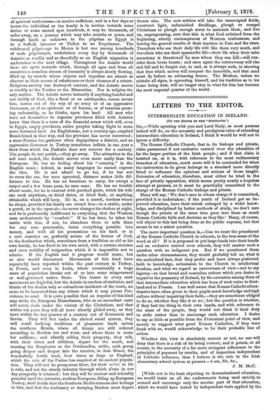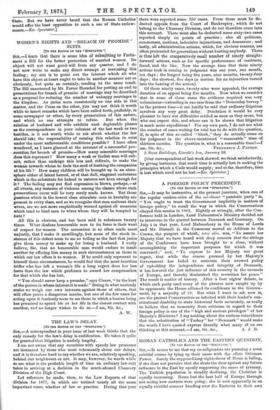LETTERS TO THE EDITOR.
INTERMEDIATE EDUCATION IN IRELAND.
(TO THE EDITOH Or THE " SPECTATOR:1
Sin,—While agreeing with you and Lord Emly, as most persons indeed will do, on the necessity and prodigious value of extending intermediate education in Ireland, I think it would be well not to ignore a difficulty.
The Roman Catholic Church, that is, its bishops and priests, claim paramount if not exclusive control over the education of far the larger portion of the Irish people ; and if that claim is insisted on, as it is, with reference to the most rudimentary branches of education, much more will it be contended for when the instruction to be given belongs to a standard more directly fitted to influence the opinions and actions of those taught. Extension of education, therefore, must either be tried in the face of priestly opposition, which seems pretty nearly a hopeless attempt at present, or it must be practically committed to the charge of the Roman Catholic bishops and priests.
Many will say, We don't care to whose charge it is committed, provided it is undertaken ; if the youth of Ireland get an im- proved education, have their minds enlarged by a wider know- ledge, and disciplined by better methods of study, we don't care though the priests at the same time pour into them as much Roman Catholic faith and doctrine as they like.' Many, of course, will object to this last being done at the public expense, but that seems to me a minor question.
The more important question is,—Can we trust the priesthood
of the Roman Catholic Church to educate, in the true sense of the word at all ? If it is proposed to put large funds into their hands and an exclusive control over schools, they will answer such a question with an indignant yes. But if we questioned them under other circumstances, they would probably tell us, what is the undoubted fact, that they prefer and have always preferred faith to knowledge, submission to the Church to intellectual freedom, and what we regard as narrowness of view—not to say bigotry—to that broad and masculine culture which you desire to impart to the peasantry of Ireland, by the extension among them of that intermediate education which has been of such value to Scot- land and to Prussia. Jam well aware that Roman Catholic educa- tionists have often given to their pupils much knowledge and high culture without impairing their faith,—they are sometimes obliged to do so, whether they like it or no ; but the question is whether, if they had the thing in their own hands, and with reference to the mass of the people, they would not think it their duty to stifle rather than to encourage such education. I desire to say as little is possible from the Protestant point of view, and merely to suggest what good Roman Catholics, if they were frank with us, would acknowledge to be their probable line of action.
Whether this view is absolutely correct or not, no one will deny that there is a risk of its being correct; and it points, at all events, to the necessity of a far more stringent adherence to the principles of payment by results, and of inspection independent of Catholic influence, than I believe is the rule in the Irish elementary-school system at present.-1 am, Sir, &c., J. M. McC.
[While not in the least objecting to denominational education, we would insist on all the endowments being used strictly to reward and encourage only the secular part of that education, which we would have tested by independent tests applied by the
State. But we have never heard that the Roman Catholics would offer the least opposition to such a use of State endow- ments.—En. Spectator.]



































 Previous page
Previous page